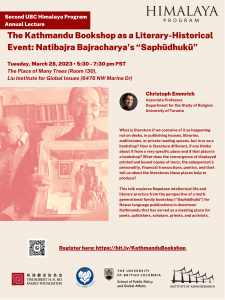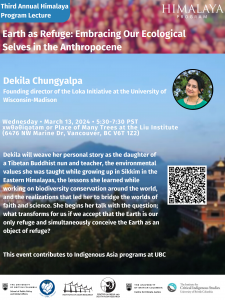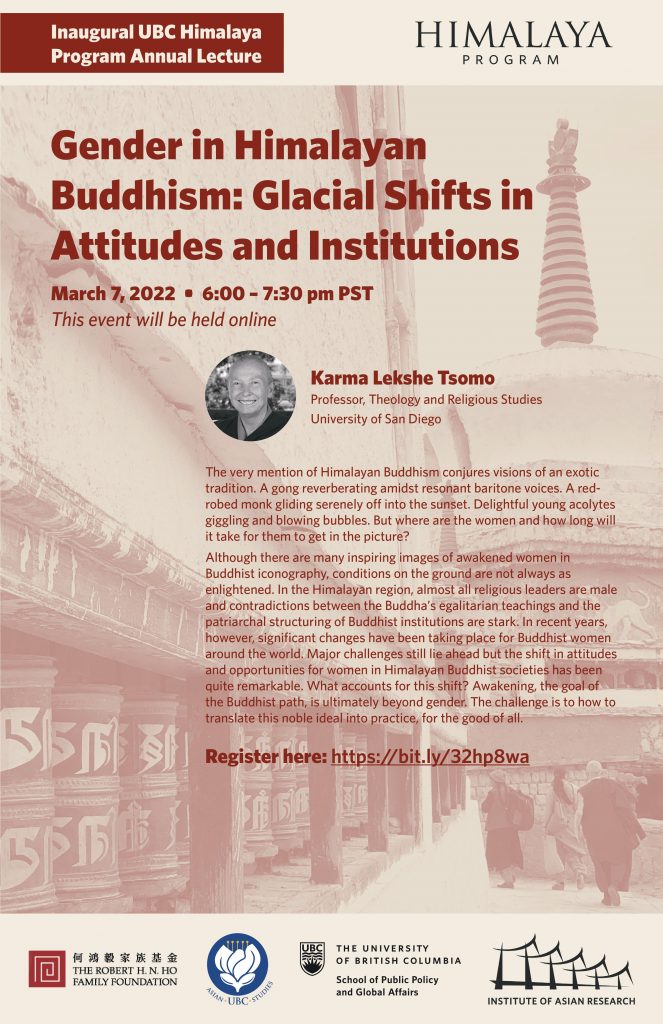The UBC Himalaya Program Annual Lecture was established in order to create an interdisciplinary and inclusive node for Himalayan Studies in Canada by drawing together faculty, students, and community members from across UBC and the Lower Mainland for exchange. The lectures will provide a platform for sharing of scholarly work and insights about Himalayan region, including Bhutan, China, India, Nepal, Pakistan, and the Tibetan cultural zones that traverse all of these countries. Furthermore, the public lectures will connect with the general public and Himalayan community partners in Vancouver and the Lower Mainlands, such as the NCSBC and Tibetan Cultural Society depending on the focus of the respective year.
Please click below to learn more about each lecture:
"Gender in Himalayan Buddhism: Glacial Shifts in Attitudes and Institutions," with Ven. Prof. Karma Lekshe Tsomo
March 7, 2022, held virtually on Zoom.
Please click the following link to view the recording of this event: https://youtu.be/xPVPqXBj36I
Lecture description: The very mention of Himalayan Buddhism conjures visions of an exotic tradition. A gong reverberating amidst resonant baritone voices. A red-robed monk gliding serenely off into the sunset. Delightful young acolytes giggling and blowing bubbles. But where are the women and how long will it take for them to get in the picture?
As part of her visit, Ven. Prof. Karma Lekshe Tsomo also participated in a roundtable discussion with 10 graduate students, and made two undergraduate class visits in ASIA 431 TIbetan Literature, Genres, and Book Culture (Instructor: Dr. Dagmar Schwerk) and ASIA 311 Tibetan Buddhism (Instructor: Prof. Tsering Shakya) at the Department of Asian Studies.
 Karma Lekshe Tsomo, a specialist in Buddhist studies, has taught at University of San Diego since 2000. She offers classes in Buddhist Thought and Culture, World Religions, Comparative Religious Ethics, Religious and Political Identities in the Global Community, and Negotiating Religious Diversity in India. Her research interests include women in Buddhism, death and dying, Buddhist feminist ethics, Buddhism and bioethics, religion and politics, Buddhist social ethics, and Buddhist transnationalism. She integrates scholarship and social activism through the Sakyadhita International Association of Buddhist Women and Jamyang Foundation, an innovative education project for women in developing countries, with 15 schools in the Indian Himalayas, Bangladesh, and Laos.
Karma Lekshe Tsomo, a specialist in Buddhist studies, has taught at University of San Diego since 2000. She offers classes in Buddhist Thought and Culture, World Religions, Comparative Religious Ethics, Religious and Political Identities in the Global Community, and Negotiating Religious Diversity in India. Her research interests include women in Buddhism, death and dying, Buddhist feminist ethics, Buddhism and bioethics, religion and politics, Buddhist social ethics, and Buddhist transnationalism. She integrates scholarship and social activism through the Sakyadhita International Association of Buddhist Women and Jamyang Foundation, an innovative education project for women in developing countries, with 15 schools in the Indian Himalayas, Bangladesh, and Laos.
Second Annual Lecture Series featuring Professor Christoph Emmrich.

Tuesday, March 28th, held at at The Place of Many Trees
What is literature if we conceive of it as happening not on desks, in publishing houses, libraries, auditoriums, or private reading spaces, but in or as a bookshop? How is literature different, if one thinks about it from a very specific place and if that place is a bookshop? What does the convergence of displayed printed and bound copies of texts, the salesperson’s personality, financial transactions, poetics, and dust tell us about the literatures these places help to produce? How are the precariousness of the business, the volatility of its clients, the instability of the location, the fragility of the printed material, and the mortality of the shopkeeper part of a hitherto maybe too little thought-about transactional, evanescent, yet momentarily powerful aspect of literature?
This talk explores a Himalayan literature’s location from the perspective of a multi-generational family bookshop (“Saphūdhukū”) for Newar language publications in downtown Kathmandu, run from within an old Buddhist monastic shrine, clandestinely under the Rana and Shah regimes, openly since the democratization of the country, serving as a meeting place for priests, poets, scholars, publishers, and activists, and promoting Marxism, Buddhism, avant-garde literature, and Newar language nationalism alike. The reminiscences of the shop’s late owner, Natibajra Bajracharya, who passed away in early 2019, reflections on life and business by members of his family, critical voices of prominent figures who owe their profile in Newar public life to their participation in Natibajra’s transactions, and, last but not least, the corpus of texts that have circulated through and emerged from this site shall help reflect on the literary event that is the bookshop.
 Christoph Emmrich (Ph.D. University of Heidelberg, 2004) is Associate Professor of Buddhist Studies at the University of Toronto. He engages with fields as diverse as Nepalese and Burmese Buddhism, Sanskrit, Pali, Newar, Burmese and Mon literature, and Tamil Jainism. He works with ritual specialists, girl children, and young women among the Newars in the Kathmandu Valley (Nepal) and in Yangon, Mandalay, and Mawlamyine (Burma) studying their involvement in Buddhist and Hindu practices related to marriage, coming-of-age, gender, childhood, and the writing of ritual. He has worked on canonical Theravāda and Śvetāmbara Jain doctrines of time, as well as on the history of Jain literature and religious institutions in North and South Arcot, Tamil Nadu. In his work, he addresses questions of resemblance and resistance, transfer and translation, mimesis and memory, institution and event. His latest book Writing Writes for Newar Girls: Marriage and Menarche in Kathmandu Valley Ritual Manuals is forthcoming with Brill. Currently, he is leading a team, located at the University of Toronto, the University of Virginia, and in Kathmandu, that is compiling the Newar Online Dictionary (NOD), the first academic electronic meta-dictionary of classical and modern Newar.
Christoph Emmrich (Ph.D. University of Heidelberg, 2004) is Associate Professor of Buddhist Studies at the University of Toronto. He engages with fields as diverse as Nepalese and Burmese Buddhism, Sanskrit, Pali, Newar, Burmese and Mon literature, and Tamil Jainism. He works with ritual specialists, girl children, and young women among the Newars in the Kathmandu Valley (Nepal) and in Yangon, Mandalay, and Mawlamyine (Burma) studying their involvement in Buddhist and Hindu practices related to marriage, coming-of-age, gender, childhood, and the writing of ritual. He has worked on canonical Theravāda and Śvetāmbara Jain doctrines of time, as well as on the history of Jain literature and religious institutions in North and South Arcot, Tamil Nadu. In his work, he addresses questions of resemblance and resistance, transfer and translation, mimesis and memory, institution and event. His latest book Writing Writes for Newar Girls: Marriage and Menarche in Kathmandu Valley Ritual Manuals is forthcoming with Brill. Currently, he is leading a team, located at the University of Toronto, the University of Virginia, and in Kathmandu, that is compiling the Newar Online Dictionary (NOD), the first academic electronic meta-dictionary of classical and modern Newar.
Earth as Refuge: Embracing Our Ecological Selves in the Anthropocene.

Abstract & Bio:
What do we and our societal systems need to transform given how we are at the edge of a planetary precipice with a cascade of environmental and climate crises ahead of us? Dekila Chungyalpa, the founding director of the Loka Initiative at the University of Wisconsin-Madison, has been working with faith leaders and culture keepers of Indigenous traditions for over 15 years collaborating on solutions that answer this question. Dekila will weave her personal story as the daughter of a Tibetan Buddhist nun and teacher, the environmental values she was taught while growing up in Sikkim in the Eastern Himalayas, the lessons she learned while working on biodiversity conservation around the world, and the realizations that led her to bridge the worlds of faith and science. She begins her talk with the question; what transforms for us if we accept that the Earth is our only refuge and simultaneously conceive the Earth as an object of refuge?
